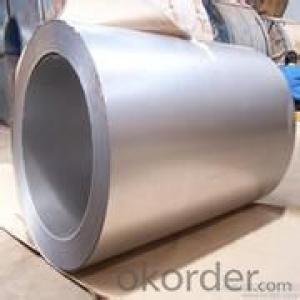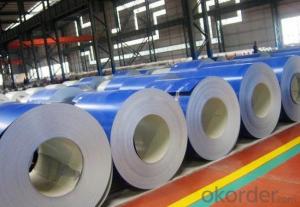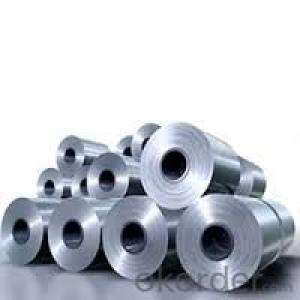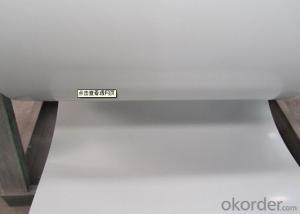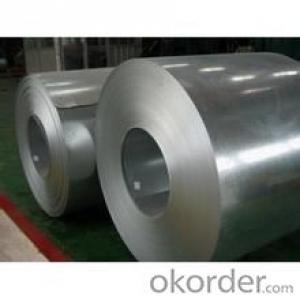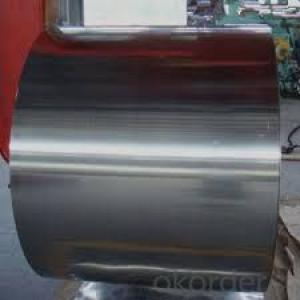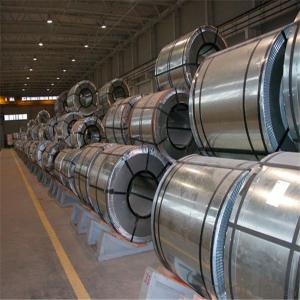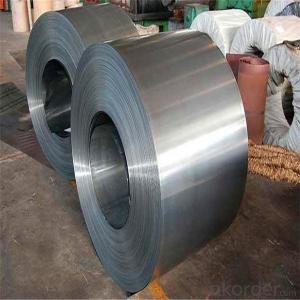Excellent Cold Rolled Steel Coil/Sheet -SPCD
- Loading Port:
- Tianjin
- Payment Terms:
- TT OR LC
- Min Order Qty:
- 30 m.t.
- Supply Capability:
- 5000000 m.t./month
OKorder Service Pledge
OKorder Financial Service
You Might Also Like
Specification
COLD ROLLED STEEL | |
Thicknenss | 0.10mm-4.00mm |
Width | 600mm-2000mm |
Sheets length | 1200-6000mm |
Coil inner diameter | 508-610mm |
Surface treatement | matt finish/bright finish,oiling/dry, bright anneal/black anneal |
Coil weight | 3-5t |
Package & Delivery
Package details: Standardseaworthy packing for international delivery.
Delivery: According to theexact quantity of your order.
Quality of the goods could be guaranteed. The finished product has a variety of excellent capabilities, such as continuous rolling, degreasing, annealing, skin pass, slitting and cut to length line etc. Along with it many rocessing capability and smooth, flat surface. It’s widely used in outdoor and interior decoration, furnishing
Our products enjoy an excellent reputation and have been exported to Europe, South-America, the Middle-East, Southeast-Asia, Africa and Russia etc.. We sincerely hope to establish good and long-term business relationship with your esteemed company.
- Q: Can a steel at 0.0055 of thickness still be powerful enough to bash skulls? As well as stop handgun cartridges or at least weaken them?You see, i had an idea of making a cylindrical Knuckles made from steel. By my dimensions, 5in diameter, 12 inch h1 and 15 in h2. Half-Sphere: a sphere that is cut in half for the dome at the fist:( [ pi x ( d ^ 3) ] / 6 ) / 2Cylinder
- I don't follow your calculations. It seems to me that the piece you show could be made from .01 steel and still be less than a pound. Also, it is hard to get steel thinner than .015 because anything thinner is not very useful. If you made it out of .015 steel and used a high strength steel, it might be useful. You wouldn't be bashing any skulls, but with some spikes on the end, it could do some damage, and protect against knives or other hand weapons. You also won't get any bullet resistance out of anything that thin. If you want to bash skulls and deflect bullets, you have to get up to at least .10 and several pounds. Any weight on your hands slows down the speed of your punch, but this is compensated for by the increased energy of impact carried by the extra mass. Also, having something hard to protect your hands allows for harder hits and more damage to the opponent. An interesting idea, but it would take some testing to figure out the optimum configuration. One problem I see is that it completely encloses the hand, making it impossible to use the hand for anything else. So you would have to put it on and take it off a lot, and there would be cases where you wouldn't be able to put it on when you needed it. For that reason, I would not wear two at one time. I would make it heavier and wear it on one hand for bashing skulls and deflecting weapons, and keep the other hand free for other things.
- Q: Can steel coils be used in the production of medical equipment?
- Medical equipment production often incorporates steel coils. Steel, being a versatile material, is renowned for its strength, durability, and ability to withstand diverse environmental conditions. It is frequently employed in the manufacture of medical equipment such as surgical instruments, orthopedic implants, hospital beds, and diagnostic machines. The usage of steel coils as raw materials is commonplace in the production process. They can be processed and shaped into a multitude of forms, sizes, and components essential for medical equipment. By cutting, shaping, and welding the coils, intricate parts with precise specifications can be crafted, guaranteeing the quality and performance of the final product. Additionally, steel coils can undergo surface treatment to enhance their resistance to corrosion. This makes them appropriate for use in medical environments where cleanliness and hygiene are crucial. Electroplating or powder coating can be applied as protective coatings, offering an extra layer of defense against rust and other forms of degradation. Moreover, steel proves to be a cost-effective material, making it an appealing choice for manufacturers of medical equipment. Its availability and affordability render it a preferred option for producing high-quality medical devices while managing production costs. To summarize, the utilization of steel coils in the production of medical equipment is indeed viable. Their strength, durability, versatility, and cost-effectiveness make them an ideal selection for manufacturing various components and instruments utilized in the healthcare industry.
- Q: What are the main applications of steel coils?
- The main applications of steel coils include manufacturing of automobiles, construction materials, appliances, machinery, and various industrial sectors. They are also used in the production of pipes, tubes, roofing, and packaging materials.
- Q: How are steel coils used in construction?
- Steel coils are commonly used in construction for a variety of purposes, such as creating structural frameworks, reinforcing concrete, and manufacturing various building components like beams, columns, and trusses. The coils are unrolled and cut to specific dimensions, allowing them to be easily shaped and welded into various structural elements. This versatile material provides strength, durability, and flexibility, making it an essential component in constructing buildings, bridges, and other infrastructure projects.
- Q: How can the outer diameter and weight of steel coil be converted?
- When it comes to this question, in fact, a lot of them are irrelevant. The weight of the steel rolls means that there is a unit weight called the weight of each mm in the width of the steel coil
- Q: What are the different methods of testing the mechanical properties of steel coils?
- There are several methods available for testing the mechanical properties of steel coils. These methods are crucial for determining the strength, ductility, and overall quality of the steel. Some of the commonly used methods include: 1. Tensile testing: This method involves applying a tensile force to a steel coil until it fractures. The test measures the maximum stress a material can withstand before breaking, as well as its elongation and reduction in cross-sectional area. Tensile testing provides important information about the ultimate tensile strength, yield strength, and elongation of the steel coil. 2. Hardness testing: Hardness testing determines the resistance of a material to indentation or scratching. Numerous methods are available for measuring the hardness of steel coils, such as Brinell, Vickers, and Rockwell hardness tests. These tests provide an indication of the steel's ability to resist deformation and wear. 3. Bend testing: Bend testing involves subjecting a steel coil to a controlled bending force until it reaches a specified angle or until a crack appears. This test assesses the ductility and flexibility of the steel, as well as its resistance to cracking or fracture under bending stress. 4. Impact testing: Impact testing measures the ability of a steel coil to absorb energy when subjected to a sudden shock or impact. The most commonly used method is the Charpy impact test, where a notched specimen is struck by a pendulum hammer, and the energy absorbed during fracture is measured. This test evaluates the toughness and resistance to brittle fracture of the steel coil. 5. Fatigue testing: Fatigue testing involves subjecting a steel coil to repeated or cyclic loading to simulate the stresses it may encounter during its intended use. This test assesses the steel's resistance to fatigue failure and its ability to withstand repeated stress over an extended period. 6. Ultrasonic testing: Ultrasonic testing utilizes high-frequency sound waves to detect defects or flaws in the steel coil. This non-destructive testing method can identify internal or surface defects, such as cracks, voids, or inclusions, which may affect the mechanical properties of the steel. It is important to note that these testing methods are often performed in accordance with industry standards and specifications, such as ASTM (American Society for Testing and Materials) or ISO (International Organization for Standardization) standards, to ensure accurate and reliable results.
- Q: Can steel coils be coated with chemical-resistant materials?
- Yes, steel coils can be coated with chemical-resistant materials. These coatings provide a protective barrier against chemical corrosion and can help extend the lifespan of the steel coils in environments where they may be exposed to corrosive chemicals or substances.
- Q: How are steel coils used in the production of automotive suspension systems?
- Steel coils are used in the production of automotive suspension systems as they provide the necessary support and flexibility to absorb shocks and vibrations. These coils are typically used in the construction of coil springs, which are then integrated into the suspension system to ensure a smooth and comfortable ride for the vehicle.
- Q: Is there any way to melt steel without the intense heat of a blast furnace?
- So unless you have a large anount of steel in a large oven and meticulous process control including chemical sampling, your product will end up looking like a piece of iron age metal. But if all you want is to see steel melt, any old blowtorch will do the job. The metal at the end of the process will be useless for pretty much any technical purposes, though.
- Q: What are the different types of steel coil edge treatments?
- There are several different types of steel coil edge treatments used in the manufacturing and processing of steel coils. These treatments are done to enhance the edge quality, protect against damage, and facilitate handling and processing of the coils. Some of the common types of steel coil edge treatments include: 1. Mill Edge: This is the standard edge treatment provided by the steel mill. It is the raw edge of the steel coil that has been produced during the hot rolling process. Mill edge is typically sharp and may have some irregularities. 2. Slit Edge: Slit edge is a type of edge treatment where the coil is slit to the desired width, and the edges are then processed to remove any burrs or unevenness. Slit edge coils have smoother edges compared to mill edge coils. 3. Deburred Edge: Deburring is a process that removes any sharp or rough edges from the coil. It is done using specialized equipment or techniques to create a smoother and safer edge. Deburred edges are commonly used in applications where safety and handling are critical. 4. Rounded Edge: Rounded edge treatment involves rounding the edges of the coil to reduce the risk of damage during handling and processing. This treatment is often used in applications where the coil needs to be uncoiled or fed into machinery without causing any damage. 5. Beveled Edge: Beveling is a process where the edges of the coil are chamfered or cut at an angle. Beveled edges are used in applications where easy insertion, joining, or welding of the coil is required. The beveling process also helps to improve the strength and durability of the edge. 6. Sheared Edge: Shearing is a cutting process where the coil is cut to the desired width using high-pressure blades or scissors. Sheared edge treatment provides a clean and straight edge, free from burrs or irregularities. It is commonly used in applications where precise dimensions and a smooth edge are required. These are just a few of the different types of steel coil edge treatments commonly used in the industry. The choice of edge treatment depends on the specific requirements of the application, such as handling, processing, safety, and aesthetics.
Send your message to us
Excellent Cold Rolled Steel Coil/Sheet -SPCD
- Loading Port:
- Tianjin
- Payment Terms:
- TT OR LC
- Min Order Qty:
- 30 m.t.
- Supply Capability:
- 5000000 m.t./month
OKorder Service Pledge
OKorder Financial Service
Similar products
Hot products
Hot Searches
Related keywords
